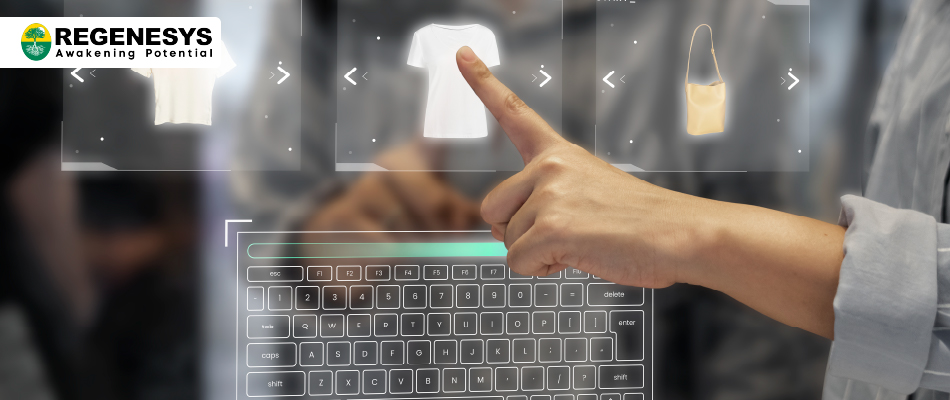The retail industry is transforming, driven by rapid technological advancements, evolving consumer behaviours, and shifting market dynamics. As aspiring business professionals pursuing a Bachelor of Business Administration (BBA) degree, it is crucial to understand the emerging trends and insights shaping the future of retail management. The advent of e-commerce, mobile commerce, and omnichannel retailing has redefined how consumers shop and interact with brands. Retailers must adapt their strategies, leveraging digital technologies to enhance customer experiences, streamline operations, and drive innovation. From personalised shopping experiences to data-driven inventory management and supply chain optimisation, the future of retail management demands a deep understanding of these trends.
In this article, we will uncover the new trends in BBA retail and learn about the skills you get from the BBA in the retail programme.
Table Of Contents
- Evolution of Retail Management
- Current Trends of Bachelor of Business Administration in Retail
- What are the skills you can get from a Bachelor of Business Administration in Retail?
- Conclusion
- Frequently Asked Questions
Evolution of Retail Management
The evolution of retail management reflects a dynamic interplay between technological advancements, changing consumer behaviours, and broader economic shifts. Historically, retail was predominantly a brick-and-mortar affair, where the main strategies revolved around product placement, store location, and face-to-face customer service. Over the decades, the emergence of mass media, global supply chains, and a growing consumer culture significantly expanded the scope and scale of retail operations, introducing a more centralised and systematic approach to managing stores and inventories.
With the advent of the internet and digital technology in the late 20th and early 21st centuries, retail management underwent a transformative shift towards e-commerce, fundamentally altering how retailers interact with their customers. Online shopping platforms, data analytics, and digital marketing have since become central components of retail strategy, enabling businesses to reach a global audience with unprecedented precision and efficiency. This digital transformation has not only enhanced operational capabilities but also led to the development of entirely new retail formats and business models, such as omnichannel retailing, which integrates various shipping methods available to consumers today.
Current Trends of Bachelor of Business Administration in Retail
Some of the current trends of the BBA in the retail programme are as follows:
1. Emphasis on Omnichannel Retailing
BBA programmes increasingly focus on integrating online and offline retail channels to provide seamless, consistent customer experiences across multiple touchpoints. Students learn about strategies for creating unified shopping journeys, inventory management, and optimising the omnichannel supply chain.
2. Data Analytics & Customer Insights
With the abundance of data generated through various retail channels, the BBA curriculum now emphasises data analytics and customer insights. Students learn to leverage data-driven decision-making, predictive modelling, and customer segmentation to drive personalised experiences and optimise business operations.
3. Experiential Retail & Immersive Technologies
As consumers seek more engaging and memorable shopping experiences, BBA programmes explore experiential retail concepts and immersive technologies. This includes virtual and augmented reality applications, interactive in-store experiences, and leveraging emerging technologies like the metaverse.
4. Entrepreneurship and Innovation
With the rapid pace of change in the retail industry, BBA programmes emphasise entrepreneurship and innovation. Students are encouraged to think critically, identify new business opportunities, and develop innovative retail concepts or business models that can disrupt traditional approaches.
5. Supply Chain Management and Logistics
Effective logistics and supply chain management is vital for retail companies to succeed. The optimisation of supply chain procedures, inventory control, last-mile delivery options, and utilising blockchain technology for increased transparency and traceability are the main topics of study in BBA programmes.
The integration of AI and advanced technologies is rapidly transforming the retail landscape. BBA programmes recognise the importance of equipping students with knowledge and skills related to AI applications in retail. BBA programmes aim to prepare students for the rapidly evolving digital landscape of retail. Students gain hands-on experience with cutting-edge technologies, enabling them to drive innovation, enhance operational efficiency, and deliver superior customer experiences in the retail industry.
What are the Skills You Can Get from a Bachelor of Business Administration in Retail?
A Bachelor of Business Administration (BBA) in Retail equips students with a broad range of skills essential for success in the retail sector. Here are some key skills that graduates can expect to acquire:
Customer Relationship Management (CRM): Understanding and implementing strategies to manage customer relationships effectively, enhancing customer loyalty and satisfaction.
Merchandising and Inventory Control: Learning how to plan, select, and manage inventory, as well as optimise product assortment and merchandising techniques to maximise sales.
Retail Marketing Strategies: Gaining insights into the dynamics of retail-specific marketing, including promotional strategies, brand management, and digital marketing.
Financial Management: Acquiring the ability to manage budgets, forecast financial needs, analyse financial statements, and apply economic principles specifically in a retail context.
Sales Techniques and Management: Developing skills in sales operations, techniques for effective selling, and managing a sales team to achieve targets and improve performance.
E-commerce and Digital Retailing: Learning about the growing field of online retailing, including e-commerce strategies, website management, and digital customer engagement.
These are some skills you can acquire from a bachelor’s degree in business administration in retail. Depending upon your future goals, you can decide whether to pursue a BBA in retail. You can learn more about different business programmes at Regenesys Business School.
Conclusion
As the retail industry continues to evolve, those who can anticipate and adapt to emerging trends will be well-positioned to thrive as future retail leaders. BBA students armed with a deep understanding of these trends and insights will be better equipped to navigate the complexities of the retail landscape, drive sustainable growth, and shape the future of this dynamic and exciting industry. Moreover, embracing entrepreneurial mindsets and fostering innovative thinking will be crucial in identifying new business opportunities and developing disruptive retail concepts.
By staying ahead of the competition, candidates can quickly get one of the idle programmes at Regenesys. You can explore different programmes and upscale your knowledge in various domains.
Frequently Asked Questions – The Future of Retail Management: Trends and Insights for BBA Students
1) What are the emerging trends shaping the future of retail management, and how can BBA students prepare to leverage these trends in their careers?
The emerging trends that are shaping the future of retail management include artificial intelligence’s effect on retail, omnichannel retailing, digital transformation, personalised customer experiences, and sustainability.
2) How is technology impacting retail management?
Technology is revolutionising retail management by enabling better data analysis for decision-making, streamlining operations through automation, enhancing customer experiences through personalised marketing and service, and facilitating omnichannel retailing.
3) What are the challenges and opportunities retailers face in the current market, and how can BBA students contribute innovative solutions to address these challenges?
Rising rivalry, shifting customer tastes, interruptions in the supply chain, and sustainability issues create difficulties. This course stimulates BBA students to consider problems and opportunities for entrepreneurship in retail management with a critical and creative mindset.
4) How can BBA students gain practical experience and industry exposure in retail management during their academic journey?
Internship opportunities, industry partnerships, networking events, and experiential learning programmes available to BBA students can help them gain practical experience.
5) What are the future career prospects and growth opportunities for BBA graduates specialising in retail management, and what steps can they take to enhance their employability in this field?
Career pathways in retail management include roles in store operations, merchandising, marketing, e-commerce, supply chain management, and strategic planning. The programme provides insights into professional development, continuing education, certifications, and networking strategies that can boost employability and career advancement for BBA graduates in retail management.







